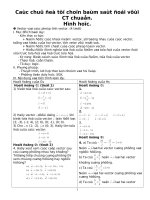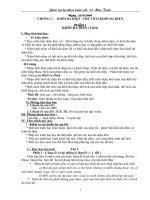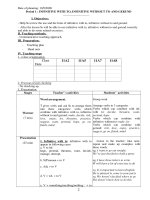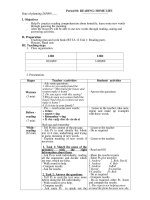giáo án tự chọn bám sát tiếng anh lớp 11 học kỳ 1
Bạn đang xem bản rút gọn của tài liệu. Xem và tải ngay bản đầy đủ của tài liệu tại đây (141.68 KB, 14 trang )
Date of preparation: 20
th
Sept, 2013
Period 1: Review of unit 1,2,3
I. Objectives: Help Ss to review :
- The infinitive and gerund
- The past tenses.
- Vocabulary and grammar exercises
II. Methods: communicative approach
III. Teaching aids: Textbook, workbook, teaching plan.
IV. Procedure
1. Class organization:
Class Attendances Teaching date Absentees
2. Check-up: During new lesson
3. New lesson:
*A. Grammar:
I. Infinitive and Gerund
1. Infinitive
Form : V( V and To – V )
2. Gerund
Form : V- ing
II. Passive infinitive and Gerund
1. Passive infinitive : To be + VpII
Ex: He agreed to be helped her
2. Passive Gerund : Being + VpII
Ex: He likes being encouraged by his mother
III. Tenses
1. The simple present tense
*Form : S + V/Vs/es +O
2. The past perfect tense
*Form: S + had + VpII + O
3. The past simple tense
*Form : S + V_ed + O
* B. Practise
Ex 1 : Put the verb in the form Ving and study the verb that it follows.
1. Could you please stop (make) _____so much noise?
2. He stopped (smoke) _____while he was working in the
garden.
3. I don’t enjoy (write) _______letter.
4. I am considering (take) ________a trip to Europe next
year.
5. Do you mind (wait) _______ a few minutes in the
reception room?
6. They agreed (lend) _____me some money.
7. He refused (answer) ___my questions.
8. He promised (come) ___back here.
9. The thief threatened (kill) ________us if we phoned the police.
10. She offered (help) _______me to clean the house.
Answers :
1. making 6. to lend
2. smoking 7. to answer
3. writing 8. To come
4. taking 9. To kill
5. waiting 10. to help
Ex2:: Give the correct tenses of the verb in the brackets.
1. We seldom (eat) ____ before 7 am.
2. The earth (circle) ______ the sun once every 365 days.
3. In what year _______ World War II (break) __________ out?
4. Mr. Green (buy) _______ a new tractor last month.
5. Where (you go) __________ for your holiday last year?
6. We (go) ___________ to the theatre last night.
7. She always (go) _______ go to bed before her mother does.
8. They (finish )their homework beore he (go) to bed
9. The sun (set) _______ in the West.
10. She ( go ) to the cinema after she
( play ) piano at home
4. Consolidation: Give the main point of the lesson : Infinitive and gerund, tenses
5. Homework: Ask Ss to review unit 1,2,3
Date of preparation: 20
th
Sept, 2013
Period 2: Review of unit 1,2,3
I. Objectives: Review unit 1,2,3 by doing exercises on reading and writing
II. Methods: communicative approach
III. Teaching aids: Textbook, workbook, teaching plan.
IV. Procedure
1. Class organization:
Class Attendances Teaching date Absentees
2. Check-up: During new lesson
3. New lesson:
* Exercise 1. Choose the word or pharse among A,B,C or D that best fits the
blank space in the following passage:
Why do people think ? Often because they ( 1) , but this can’t be the only reason
there must be other reasons, too. In many coutries, when friends see (2) , they often
have a drink while they sit and talk. Many English people don’t need anyone else,
they drink tea several times a day even if they are alone. In most coutries, people say
(3)… when they drink together. The English (4) “Cheers”. In all coutries, there are
many places (5)… main purpose is to sell drinks. Since there are so many of those
places, it seemed that many people drink more often than they really need to.
1. A. have thirsty B. have thirst C. are thirsty
D. are thirst
2. A each other B. themselves C. them D. another
3. A. something specially B. something special C. anything specially D.
anything special
4. A. often say B. often says C. say often
D.says often
5.A. of which B. that the C. what’s D. where the
KEY: 1. C 2. A 3. B 4. A 5. D
* Exercise 2:. SENTENCE TRANSFORMATION
1. We had our house decorated to celebrate our wedding anniversary.
A. We had someone decorate our house. B. We had to decorate our
house.
C.Our house needs to be decorated. D. We helped my father decorate
our house.
2. She is sure to come to the party.
A. I’m sure she came to the party. B. She’ll surely come to the
party.
C.She is certain she came to the party. D. She knows they will come to the
party.
3. She is not old enough to get married.
A. She is too young get married. B. She is so young that she can’t
get married.
C.She is much too young, so can get married.D. She is so young that she can
get married.
4. My friend is keen on learning different languages.
A. It is my friend keenness to learn different languages.
B. Learn different languages is my friend’s hobby.
C. My friend would like to learn different languages.
D. Different languages is my friend’s hobby.
5. When did you begin to work in remote or mountainous areas?
A. How long did you work in remote or mountainous areas?
B. How long did you begin working in remote or mountainous areas?
C. How long are you working in remote or mountainous areas?
D. How long have you been working in remote or mountainous areas?
6. I haven’t worked in orphanages for years.
A. I haven’t worked in orphanages for long ago.
B. The last time I worked in orphanages since years ago.
C. I didn’t work in orphanages years ago.
D. I last worked in orphanages years ago.
7. Our parents don’t like us to come home late.
A. Our parents don’t care about our coming home late.
B. Our parents don’t approve of our coming home late.
C. Our parents want us to stay home.
D. Our parents would rather us to come home early
8. “I’m sorry I forgot your birthday”, Harry told Mary.
A. Harry said sorry to Mary for forgetting her birthday.
B. Harry felt sorry to forget Mary’s birthday.
C. Harry apologized Mary for having forgotten her birthday.
D. Harry really felt a pity not to remember Mary’s birthday.
9. My friend doesn’t really want to talk to him.
A. My friend would rather not talk to him. B. My friend is not going to talk
to him
C.My friend won’t talk to him. D. My friend don’t mean to talk
to him.
10.His friend is a man of extreme honest man.
A. His friend is an extremely honest man.
B. It is extremely honest that his friend is a man.
C. It is of extreme honesty to a man like his friend.
D. His friend is an extreme honesty man.
Key:
1. A 2. B 3. B 4. C 5. D 6. D 7. B 8. C 9. A
10. A
* Exercise 2: . SENTENCE COMPLETION
1. It took me a long time to _________________________
A. get used wearing to glasses. B. get used to wearing glasses.
C.get used to wear glasses. D. getting used to wearing glasses.
2. I expected_______________, but I wasn’t.
A. to invite to the party. B. to be invited to the party.
C. inviting to the party. D. being invited to the party.
3. The doctor advised Robert___________________
A. to take more exercise if he wanted to lose weight.
B. to take more exercise so that he could to lose weight.
C. that he takes more exercise to lose weight.
D. that he should take more exercise in order that to lose weight.
4. Taking exercise____________________________
A. is good health for you. B. is good for your healthy.
C. is a good health for you. D. is good for your health.
5. He went to the library_______________
A. so that to borrow a book. B. to borrowing a book.
C. so as to borrow a book. D. in order that borrow a book.
Key: 1. B 2. B 3. A 4. D 5. C
4. Consolidation: Give the main point of the lesson
5. Homework: Ask Ss to review unit 1,2,3
Date of preparation: 9/11/2013
Period 3: Review of unit 4,6
I. Objectives: Help Ss to review :
- Reported speech
- Gerund and present participle
II. Methods: communicative approach
III. Teaching aids: Textbook, workbook, teaching plan.
IV. Procedure
1. Class organization:
Class Attendances Teaching date
2. Check-up: During new lesson
3. New lesson:
*A. Grammar:
I. REPORTED SPEECH WITH GERUND
1. thank sb for Ving : cảm ơn ai đó về việc gi
2. congratulated sb on Ving : Chúc mừng ai đó về việc gi
3. Insist on Ving : Khăng khăng đièu gi
4. apology for Ving : Xin lỗi về điều gi
5. prevent/stop sb from Ving : Ngăn cản ai đó làm gi
6. thinking of Ving : Nghĩ về điều gi
7. suggest Ving : Gợi ý điều gi
II. GERUND AND PRESENT PARTICIPLE
1. Gerund (danh động từ)
Ving
* Làm chủ từ(subject):
* Làm tân ngữ sau động từ chính (thường) và giới từ
2. Present participle (hiện tại phân từ)
* Đứng sau các động từ chỉ cảm quan (see, smell, hear, touch, feel, taste,…) –S +
VERB + sb / sth +Ving
* Dùng trong các thì tiếp diễn ; S + BE + Ving
* Rút gọn mệnh đề khi hai hành động song song: Ving + (O), S + V + …
* Dùng trong cấu trúc sau:
- It is no use / no good + Ving (thật vô ích)
- There has no point in + Ving (thật vô ích)
- It is (not) worth + Ving (thật (không) đáng)
- To have difficulty + Ving ( gặp khó khăn)
- It is a waste of time / money + Ving (mất thờigian/tốn tiền)
- To spend / waste time (money) + Ving (dành , bỏ, lãng phí tiền (thời gian)
*. Dùng sau ‘ while / when ” để rút gọn mệnh đề khi cùng chủ từ trong ngữ cảnh:
S + V + O When / While + Ving +
* Dùng cho hành động kéo dài lâu hơn:
S + Verb + (O) + Ving +
* B. Practise
Exercise 1: Rewrite these sentences
1. He said : “ congratulation! You’ve passed the exam “
-> He
2. “ Thank you for your help “ she said
- > She
3. He said “ Let me pay for the meal “
-> He
4. My mother told me :” Why don’t we go shopping ?”
- > My mother
5. they said “ I’m sorry I’m late “
- > They
* Keys:
1, He congratulationed me on passing the exam
2. She thanked me for helping her
3. He insisted on paying foe the meal
4. My mother suggested going shopping
5, They apologized for being late
Exercise 2 : Put the verbs into correct forms
1. He wanted (see) ________________the house where the
president was born.
2. He is expected (arrive) _____________________in a few
4. Consolidation: Give the main point of the lesson
5. Homework: - Ask Ss to review unit 4,6
- Finish exercises in the workbooks
Date of preparation: 9/11/2013
Period 4: Review of unit 4,6
I. Objectives: Help Ss to review :
- Perfect gerund and perfect participle
- Vocabulary and grammar exercises
II. Methods: communicative approach
III. Teaching aids: Textbook, workbook, teaching plan.
IV. Procedure
1. Class organization:
Class Attendances Teaching date
2. Check-up: During new lesson
3. New lesson:
*A. Grammar:
PERFECT GERUND & PERFECT PARTICIPLE)
1. PERFECT GERUND
* Nhận dạng:
1. Câu đơn (S + V + (O)).
2. S + Verb + having + V3/ed.
3. S + be + prep + having + V3/ed.
2. PERFECT PARTICIPLE
* Nhận dạng:
1. Câu phức ( ________, ________ ).
2. Having + V3/ed + , S + V2/ed +
* B. Practise
Exercise 1: Choose the correct answer:
1. The teacher decided (accepting/to accept) the paper.
2. They appreciate (to have/having) this information.
3. His father doesn’t approve of his (going/ to go) to Europe.
4. We found it very difficult (reaching/ to reach) a decision.
5. Donna is interested in (to open/opening) a bar.
6. George has no intention of (to leave/leaving) the city now.
7. We are eager (to return/returning) to school in the fall.
8. We would be better off (to buy/ buying) this car.
9. She refused (to accept/ accepting) the gift.
10. Mary regrets (to be/being) the one to have to tell him.
* Key:
1. to accept 2. having 3. going 4. to reach 5. opening
6. leaving 7. to return 8. buying 9. to accept 10. being
Exercises 2: Choose best answer:
1. The bicycle he lent me badly needed_____.
A. to clean B. clean C. cleaning D. to be cleaning
2. I got tired of_____since she kept giving me the same food every day.
A. eat B. to eat C. eating D. to eating
3. Please come on time. I hate_____
A. being kept waiting B. being kept wait C. to be kept waiting D. to be kept wait
4. He says he doesn’t remember _____ you.
A. to promise to help B. to promise helping C. promising to help D. promising
helping
5. I am not used to _____early. I’d rather stay in bed a bit longer.
A. get up B. getting up C. to getting up D. to get up
6. It's such a waste _____good food to Dave - he really doesn't appreciate it.
A. to give B. to giving C. giving D. give
4. Consolidation: Give the main point of the lesson
5. Homework: - Ask Ss to review unit 4,6 and prepare for the 45’ test
Date of preparation: 12/2013
Period 5: Review of unit 7,8
I. Objectives:
Help Ss to review the knowledge in unit 7,8 by doing exercises
II. Method: communicative approach
III. Teaching aids: Textbook, workbook, teaching plan.
IV. Procedure
1. Class organization:
Class Date of teaching Attendances
2. Check-up: During new lesson
3. New lesson:
I. Grammar:
1. Reported speech with infinitive
S + told + O + to-infinitive
asked
promised
advised
encouraged
warned
wanted
reminded
invited
2. Reported speech with gerund.
- Structures:
a. V + V-ing
admit, deny, suggest …
b. V + prep + V-ing
apologize for, complain about, confess to, insist on, object to, dream of, think of …
c. V + O + prep + V-ing
accuse … of, blame … for, congratulate … on, criticize … for, warn … about /
against, praise … for, thank … for, prevent … from
Usage: in reported speech.
- Run through the meaning of the verbs / phrasal verbs given.
Ask Ss to make some more examples with the structures given
II. Practise:
Change these sentences into reported speech:
1). "I'm sorry I have to leave so early", he said.
He ……………………………………………………
2). "Don't forget to return the book to the library", he said.
He ……………………………………………………
3). John said, "You'd better not lend them any money, Daisy."
John ……………………………………………………
4). "Please don't tell anybody what happened.” Ann said to me.
Ann ……………………………………………………
5). "Why don't we visit the National Gallery?"
She …………………………………………………
6). "Stay in bed for a few days", the doctor said to me.
The doctor …………………………………………
7). "You mustn't go out at night", our parents said.
Our parents ………………………………………….
* Key:
1. He said he was sorry to leave so early
2. He asked me to return the book to the library
3. John advised Daisy not to lend them any money
4. Ann asked me not to tell anybody what had happened
5. She suggested visiting the National Gallery
6. The doctor asked me to stay in beg for a few days
7. Our parents asked us not to go out at night
4. Consolidation: Summarize the main points of the lesson
5. Homework: Ask Ss to review unit 7,8
Date of preparation: 12/2013
Period 6: Review of unit 7,8
I. Objectives:
Help Ss to review the knowledge in unit 7,8 by doing exercises
II. Method: communicative approach
III. Teaching aids: Textbook, workbook, teaching plan.
IV. Procedure
1. Class organization:
Class Date of teaching Attendances
2. Check-up: During new lesson
3. New lesson:
I. Grammar:
* Conditional sentences
Type I: Future possible.
If clause Main clause
Present tense Future tense
Type II: Present unreal
If clause Main clause
Simple past tense
(Subjunctive)
Present conditional
(would + bare
infinitive)
Type III: Past unreal
If clause Main clause
Past perfect tense
Perfect conditional
(would have + p.p)
Conditional in reported speech
- T makes some examples:
1. “If you work hard, you’ll pass the exam”, the teacher said
The teacher said that if I worked hard, I would pass the exam
2. He said to her, “You would be punished if you came late”
He said to her that she would be punished if she came late.
(Expected: + Type 1: change the tense.
+ Type 2 + 3: not change the tenses.)
II. Practise: Choose the best answer to complete the following sentences.
1. If I ……….a lot of money now, I ………… a new car.
a. have /will buy b. have / would buy c. had/ will buy d. had/ would buy.
2. If I ……………you, I …………….do that.
a. am/ will b. were /would c. were/ will d. had been/ would.
3. if I were offered the job, I think I ………. it.
a. take b. will take c. would take d. would have taken.
4. I would be very surprised if he……………
a. refuses b. refused c. had refused d. would refuse.
5. Many people would be out of work if that factory……… down.
a. closes b. had closed c. closed d. would close.
6. If she sold her car, she ………… much money.
a. gets b. would get c. will get d. would have got.
7. They would be disappointed if we…………….
a. hadn’t come b. wouldn’t come c. don’t come d. didn’t come.
8. Would John be angry if I ……. ……his bicycle without asking?
a. take b. took c. had taken d. would take.
9. She ……….terrible upset if I lost this ring.
a. will be b. would be c. were d. had been.
10. If someone…………in here with a gun, I would be very frightened.
a. would walk b. walks c. had walked d. walked.
* Key: 1d, 2b, 3c, 4b, 5c, 6b, 7d, 8b, 9b, 10d
4. Consolidation: Summarize the main points of the lesson
5. Homework: Ask Ss to review unit 7,8









